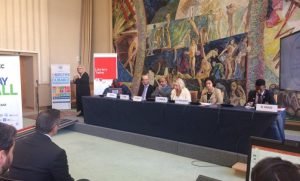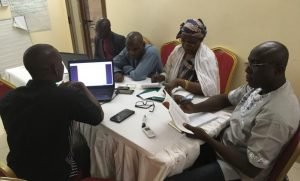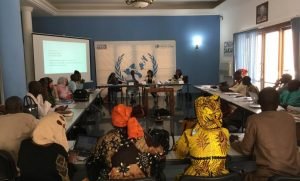
The African Disability Forum (ADF), as the regional umbrella organization representing persons with disabilities across the continent, proudly endorses the Amman-Berlin Declaration on Global Disability Inclusion, adopted at the Third Global Disability Summit held in Berlin from 2–3 April 2025.
This historic gathering of over 4,700 stakeholders—including governments, civil society, and organizations of persons with disabilities (OPDs)—reaffirmed a collective commitment to accelerating disability inclusion worldwide. As the representative voice of over 80 million Africans with disabilities, ADF recognizes the Declaration as a vital step in advancing the rights and inclusion of more than 1 billion persons with disabilities globally.
The Amman-Berlin Declaration reflects ADF’s mission to dismantle systemic barriers and foster equal opportunities for persons with disabilities across Africa. We highlight the following continental priorities:
1. A Bold Target for Inclusive Development
The Declaration’s call to allocate at least 15% of international development cooperation to disability inclusion by 2028 is a transformative commitment. In Africa, where persons with disabilities face disproportionate barriers, this pledge must result in concrete investments in inclusive education, healthcare, employment, and infrastructure. ADF urges African governments and development partners to prioritize and localize this target—ensuring that no one is left behind.
2. Amplifying the Voices of African OPDs
The Declaration reinforces the indispensable leadership of OPDs. ADF calls for strengthened, sustained funding and equitable partnerships with African OPDs—especially those led by women, youth, and persons experiencing multiple forms of discrimination. Meaningful participation must extend beyond consultation to co-leadership in shaping policies, programs, and implementation—across local, national, and continental platforms such as the African Union’s Agenda 2063.
3. Intersectional Approaches to End Discrimination
In Africa, women, girls, and children with disabilities face intersecting marginalization tied to gender, disability, poverty, and systemic exclusion. ADF welcomes the Declaration’s intersectional lens and urges stakeholders to implement policies that address these overlapping barriers—particularly in education, health, employment, and protection from violence.
4. Disability-Inclusive Humanitarian Action
Conflicts, climate change, and health emergencies disproportionately affect persons with disabilities in Africa. ADF echoes the Declaration’s emphasis on Article 11 of the CRPD and calls for inclusive humanitarian responses. Persons with disabilities must be meaningfully included in emergency preparedness, response, and recovery across all humanitarian programming on the continent.
5. Data-Driven Advocacy and Accountability
Reliable, disability-disaggregated data is essential to effective policymaking. ADF supports full implementation of Article 31 of the CRPD and calls for collaborative efforts among governments, civil society, academia, and other stakeholders to generate and use data for evidence-based planning, monitoring, and accountability.
ADF’s Commitments Moving Forward
As the leading voice for disability rights in Africa, ADF commits to:
- Mobilizing its membership—national federations, sub-regional bodies, and continental OPDs—to advocate for and support governments in achieving the 15% target.
- Strengthening partnerships with stakeholders committed to disability inclusion across sectors.
- Advancing advocacy efforts, particularly with the African Union, regional economic communities, and UN agencies, to embed disability rights in continental development agendas.
- Enhancing capacity-building for OPDs on advocacy, implementation of the CRPD and the African Disability Protocol (ADP), institutional development, national disability laws, and resource mobilization.
A Call to Action
We believe that achieving the Amman-Berlin Declaration’s vision requires unity and joint efforts. ADF calls on African governments, international donors, the private sector, and civil society to:
- Allocate dedicated national budget lines for disability inclusion;
- Enforce anti-discrimination and accessibility laws;
- Engage OPDs as equal and essential partners in all matters that affect their lives.
In the words of the Amman-Berlin Declaration:
“With over a billion reasons to change, we stand ready to join forces.”
Together, we can build a continent—and a world—where every person with a disability is included, respected, and empowered.
Nothing About Us Without Us!
Mr. Shuaib Chalken,
Executive Director
April 11, 2025







